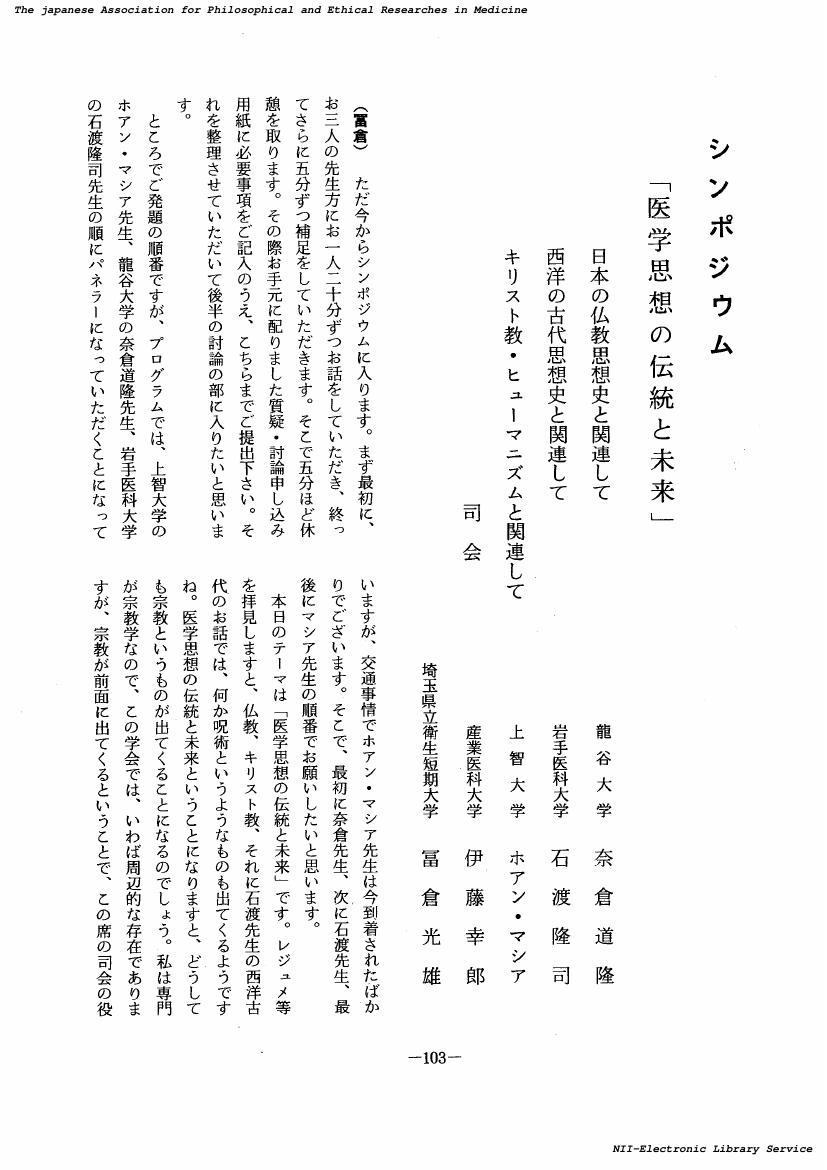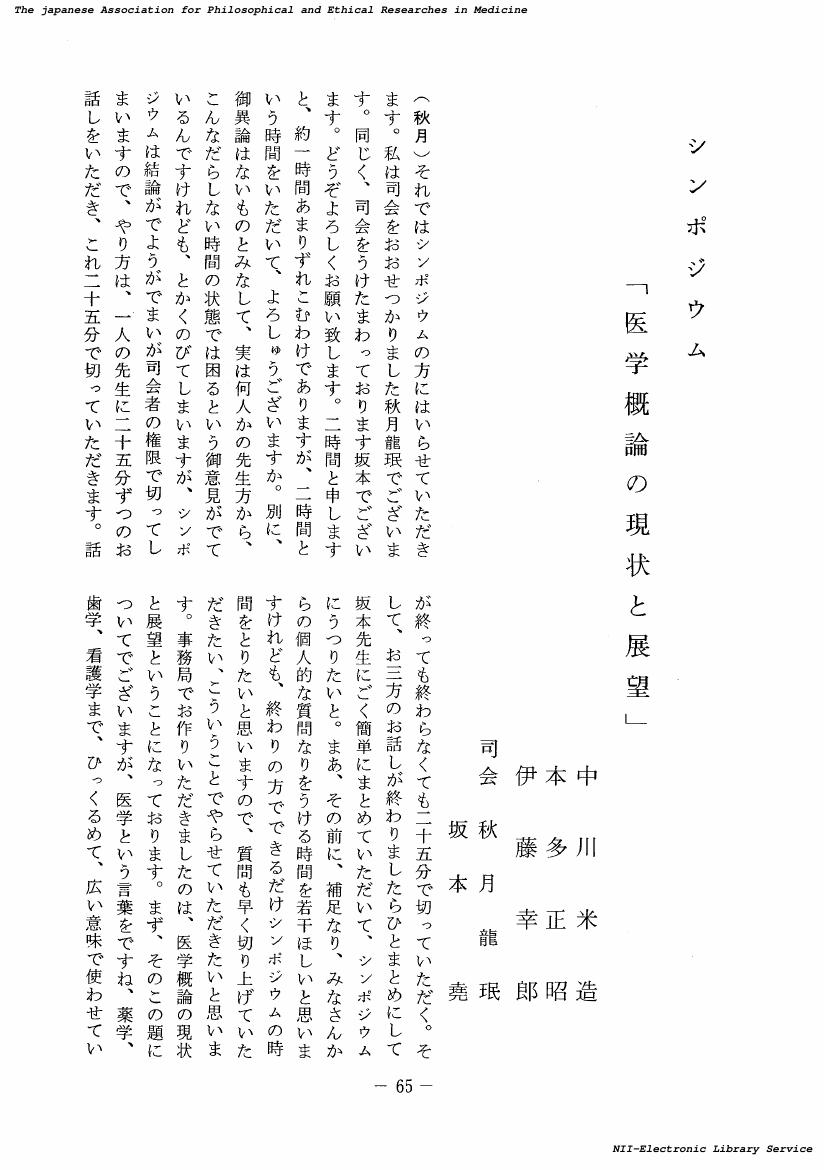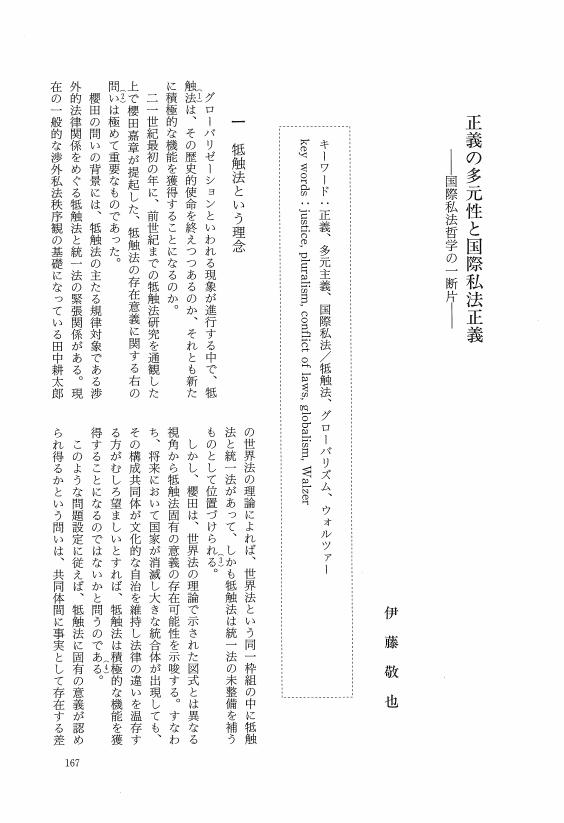1 0 0 0 OA 医学思想の伝統と未来
- 著者
- 奈倉 道隆 石渡 隆司 マシア ホアン 伊藤 幸郎 冨倉 光雄
- 出版者
- 日本医学哲学・倫理学会
- 雑誌
- 医学哲学 医学倫理 (ISSN:02896427)
- 巻号頁・発行日
- vol.6, pp.103-130, 1988-07-31 (Released:2018-02-01)
1 0 0 0 OA バイオエシックスの基礎 : 医学と医療政策における適正な意志決定法への試論
- 著者
- エンゲルハート H.トリストラム 伊藤 幸郎
- 出版者
- 日本医学哲学・倫理学会
- 雑誌
- 医学哲学 医学倫理 (ISSN:02896427)
- 巻号頁・発行日
- vol.6, pp.131-144, 1988-07-31 (Released:2018-02-01)
1 0 0 0 OA 医の倫理とその教育
- 著者
- 伊藤 幸郎
- 出版者
- 日本医学哲学・倫理学会
- 雑誌
- 医学哲学 医学倫理 (ISSN:02896427)
- 巻号頁・発行日
- vol.7, pp.42-53, 1989-07-31 (Released:2018-02-01)
Medicine has been fundamentally humanistic and ethical in its nature since its origin. It is not a pure science, as is erroneously held by most modern Japanese medical researchers. It is an applied science endowed with evident objectives, i.e. healing diseases and promoting the health of people. Moreover, "disease" and "health" are both value-laden concepts. Human conduct is judged as good or evil according to some value-laden criteria, so it is impossible to separate medicine from ethics. The word "ethics" is derived from Greek "ethos", which originally meant the custom of the people. Customs are different according to time, race, religion etc.. There is not one single ethic on this earth but there are plural ethics. This pluralism of ethics is fitted to modern democratic societies. In the field of medical ethics, current Japanese press comments are unduely concentrated on the up-to- date problems arising from high technologies (e.g.in vitro fertilization, brain death, organ transplantation etc.) However, these topics cover only partial and extraordinary phenomena in the whole of medical practice. We should rather pursue "daily medical ethics" based on everyday encounters of doctors and patients. Above all, reconsideration of the usual doctor's paternalism and popularization of informed consent throughout the medical world in Japan are urgent issues. The medical humanities have been taught in the University of Occupational and Environmental Health for 1st to 6th year medical students as a required course since the beginning of the university (1978). Some defects of lectures as mere delivery of knowledge were criticized and several new teaching techniques have been introduced. For example, in their "early exposure", freshmen are asked to attend to disabled children for 24 hours, and in "nursing practice", 5th year students are assigned to the nursing teams in the university hospital as apprentices. Through these practices the students learn by their own experiences how to find ethical problems in actual medical practice and promote their sensitivity to sick people. These techniques in the education of medical ethics as applications of behavioral sciences will develop further in Japanese medical education.
1 0 0 0 OA 脳死と人間の死
- 著者
- 伊藤 幸郎
- 出版者
- 日本医学哲学・倫理学会
- 雑誌
- 医学哲学 医学倫理 (ISSN:02896427)
- 巻号頁・発行日
- vol.5, pp.78-88, 1987-07-10 (Released:2018-02-01)
1 0 0 0 OA 臨床の知の可能性と限界 : 医師・患者関係に関する人間学的考察(第一部)
- 著者
- 伊藤 幸郎
- 出版者
- 日本医学哲学・倫理学会
- 雑誌
- 医学哲学 医学倫理 (ISSN:02896427)
- 巻号頁・発行日
- vol.4, pp.60-73, 1986-06-30 (Released:2018-02-01)
1 0 0 0 OA 医学概論の現状と展望
- 著者
- 中川 米造 本多 正昭 伊藤 幸郎 秋月 龍[ミン] 坂本 堯
- 出版者
- 日本医学哲学・倫理学会
- 雑誌
- 医学哲学 医学倫理 (ISSN:02896427)
- 巻号頁・発行日
- vol.2, pp.65-94, 1984-10-20 (Released:2018-02-01)
1 0 0 0 OA 研究発表概要研究発表概要 科学基礎論学会講演会(昭和30年5月28・29日)
1 0 0 0 OA 様相命題論理と単項述語論理の束論的考察 III
- 著者
- 伊藤 誠
- 出版者
- 科学基礎論学会
- 雑誌
- 科学基礎論研究 (ISSN:00227668)
- 巻号頁・発行日
- vol.2, no.2, pp.258-265, 1956-01-15 (Released:2009-09-04)
- 参考文献数
- 4
1 0 0 0 OA 樣相命題論理と単項述語 (集合) 論理の束論的考察 I
- 著者
- 伊藤 誠
- 出版者
- 科学基礎論学会
- 雑誌
- 科学基礎論研究 (ISSN:00227668)
- 巻号頁・発行日
- vol.1, no.3, pp.142-145, 1955-03-31 (Released:2009-09-04)
- 参考文献数
- 3
1 0 0 0 OA 樣相命題論理と單項述語 (集合) 論理の束論的考察 II
- 著者
- 伊藤 誠
- 出版者
- 科学基礎論学会
- 雑誌
- 科学基礎論研究 (ISSN:00227668)
- 巻号頁・発行日
- vol.1, no.4, pp.162-167, 1955-06-30 (Released:2009-09-04)
1 0 0 0 OA ヘーゲルの『デ・アニマ』解釈
- 著者
- 伊藤 功
- 出版者
- 日本ヘーゲル学会
- 雑誌
- ヘーゲル哲学研究 (ISSN:13423703)
- 巻号頁・発行日
- vol.2007, no.13, pp.140-148, 2007-12-15 (Released:2010-12-16)
- 参考文献数
- 12
1 0 0 0 OA ケインズの科学方法論
- 著者
- 伊藤 邦武
- 出版者
- 日本科学哲学会
- 雑誌
- 科学哲学 (ISSN:02893428)
- 巻号頁・発行日
- vol.31, no.2, pp.75-87, 1998-11-15 (Released:2009-05-29)
- 参考文献数
- 12
As a methodologist of science, John Maynard Keynes scrutinised the classical induction theory of Bernoulli and Laplace and proposed a new set of principles of induction in A Treatise on Probability (1921). He took up the same subject, after the publication of The General Theory of Employment, Interest and Money (1936), in his debate with Jan Tinbergen on econometrics. Keynes's criticism of econometrics is generally considered to be done on the ground of the principles of induction which he formulated in the former book. However, this standard interpretation seems odd, because those principles depended heavily on his theory of probability and he radically changed this analysis of probability in his mature economic theory. If he kept the theory of induction intact in his criticism of econometrics, then he was curiously absent-minded. I do not think that Keynes was such an inconsistent thinker, and I believe that his later theory of induction should be understood from the perspective of a much modern type of theory, i.e., something like a Kuhnian paradigm-bound view of science, or one of its more sophisticated variants. It is founded on the concept of inter-personal probability or 'expectation', and it is also constructed to be amenable to the interplay of 'theory and practice'.
1 0 0 0 OA 「痛み」の概念について
- 著者
- 伊藤 公一
- 出版者
- 日本科学哲学会
- 雑誌
- 科学哲学 (ISSN:02893428)
- 巻号頁・発行日
- vol.10, pp.31-40, 1977-11-10 (Released:2009-05-29)
1 0 0 0 アニメーション制作における作画工程の調査および分析
- 著者
- 中西 悠斗 七丈 直弘 伊藤 泰久 杉 正夫 ルネルバホイ グエダ 太田 順
- 出版者
- 公益社団法人 精密工学会
- 雑誌
- 精密工学会学術講演会講演論文集
- 巻号頁・発行日
- vol.2011, pp.563-564, 2011
本研究では,スケジューリング手法を用いたアニメーション制作の生産性向上に注目する.現状の制作体制を調査し,作画工程を構成する各段階での生成物と,人員の関係性をモデル化した.このモデルから課題を抽出した結果,スケジューリング手法の適用による改善が見込める課題として,制作進行が行う進捗チェックおよび作画監督が行う修正作業が律速過程となっていることを発見した.
1 0 0 0 OA 国民教育と国語教育(<特集>国民教育と国語教育-日本文学協会第一〇回大会第二日記録-)
- 著者
- 伊藤 博之
- 出版者
- 日本文学協会
- 雑誌
- 日本文学 (ISSN:03869903)
- 巻号頁・発行日
- vol.4, no.12, pp.783-798, 1955-12-01 (Released:2017-08-01)
1 0 0 0 OA 国語教育における国民的課題 : 十回大会のための問題提起(<特集>戦後十年の課題)
- 著者
- 伊藤 博之 太田 正夫
- 出版者
- 日本文学協会
- 雑誌
- 日本文学 (ISSN:03869903)
- 巻号頁・発行日
- vol.4, no.9, pp.605-613,604, 1955-09-01 (Released:2017-08-01)
1 0 0 0 OA 現代正義論の文脈における正と善の関係
- 著者
- 伊藤 泰
- 出版者
- 日本法哲学会
- 雑誌
- 法哲学年報 (ISSN:03872890)
- 巻号頁・発行日
- vol.2004, pp.163-171,199, 2005-09-30 (Released:2008-11-17)
- 参考文献数
- 7
The two concepts of “right” and “good” have an important role in the theories of justice, including Rawls's liberal theory and the theories of his opponents such as libertarians and perfectionists. Even though they have different standpoints these scholars treat the two concepts similarly; in their arguments they unanimously presuppose the sole idea of “right”. They argue namely that though their concept of “good” they pursue are different from each other, all citizens in a society would accept the same “right” as the basic condition of their coexistence. Based upon this presumption, these scholars search the idea of “right” through theoretical or historical reflection. Recently, however, scholars such as Chantal Mouffe, James Bohman and Jeremy Waldron have different arguments: they argue that it is impossible for the citizens to come up with the same idea of “right”, as there are a number of “right” competing against each other, just like there are various kinds of “good”. According to these scholars, in order to avoid a totalitarian simplification, the modern democratic society should not deny this pluralistic structure. This paper examines the latter theory focusing on its implication to the theory of justice. The following two points are stressed among others: first, this theory will help our understanding of the pluralistic character of “right” in a democratic society, and second, this theory will offer us a new perspective for handling the problems such as (a) the neutrality of the state, and (b) the priority between “good” and “right”.
1 0 0 0 OA 正義の多元性と国際私法正義-国際私法哲学の一断片
- 著者
- 伊藤 敬也
- 出版者
- 日本法哲学会
- 雑誌
- 法哲学年報 (ISSN:03872890)
- 巻号頁・発行日
- vol.2002, pp.167-174, 2003-10-20 (Released:2008-11-17)
- 参考文献数
- 19
1 0 0 0 OA ラーレンツの類型論—その論理学的背景に遡つて—
- 著者
- 伊藤 剛
- 出版者
- 日本法哲学会
- 雑誌
- 法哲学年報 (ISSN:03872890)
- 巻号頁・発行日
- vol.1995, pp.131-138, 1996-10-30 (Released:2008-11-17)
- 参考文献数
- 9
1 0 0 0 OA 初期ラーレンツの法思想の再検討 新へーゲル主義とナチズムとの接点
- 著者
- 伊藤 剛
- 出版者
- 日本法哲学会
- 雑誌
- 法哲学年報 (ISSN:03872890)
- 巻号頁・発行日
- vol.1990, pp.170-178, 1991-10-30 (Released:2008-11-17)
- 参考文献数
- 37















